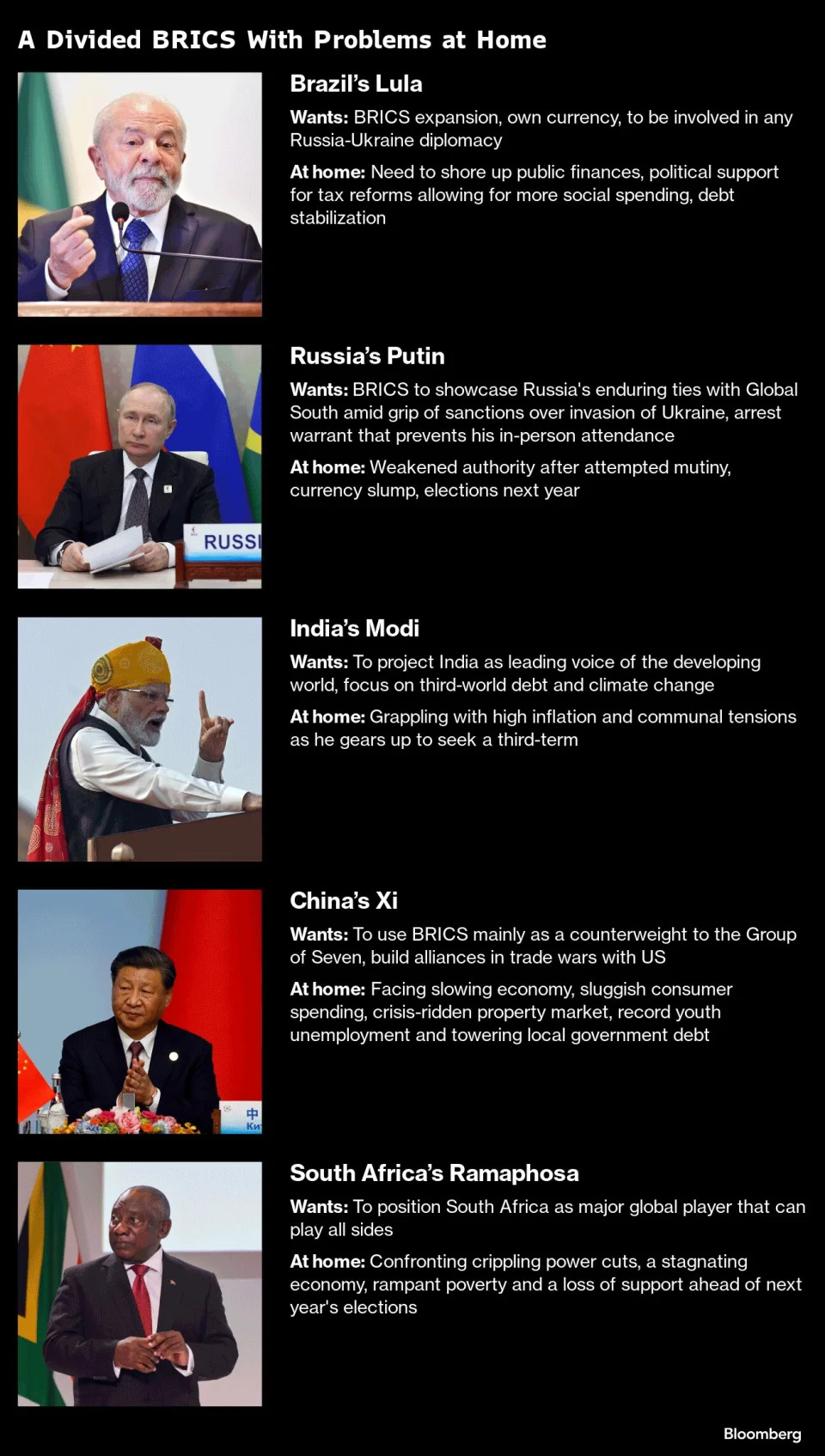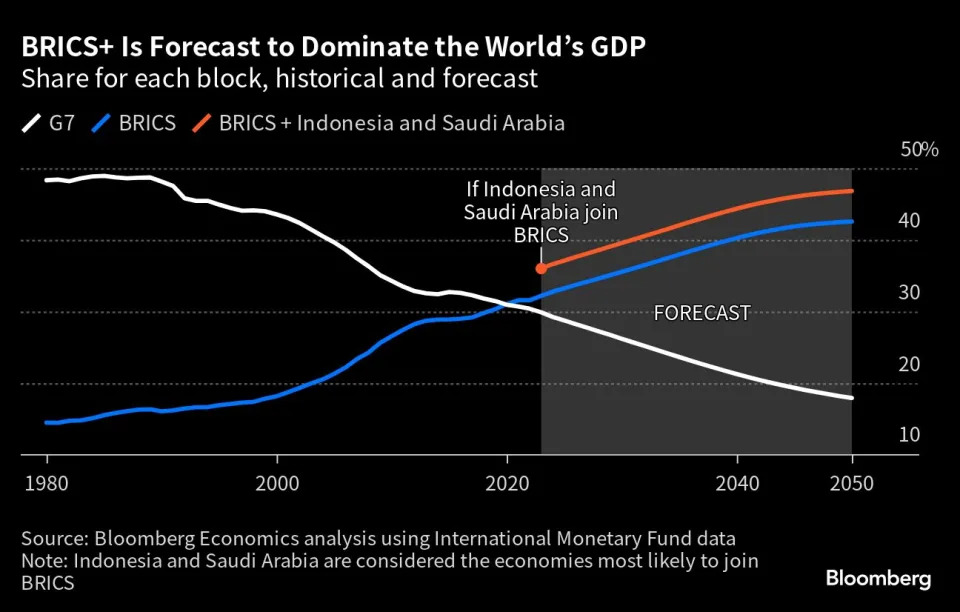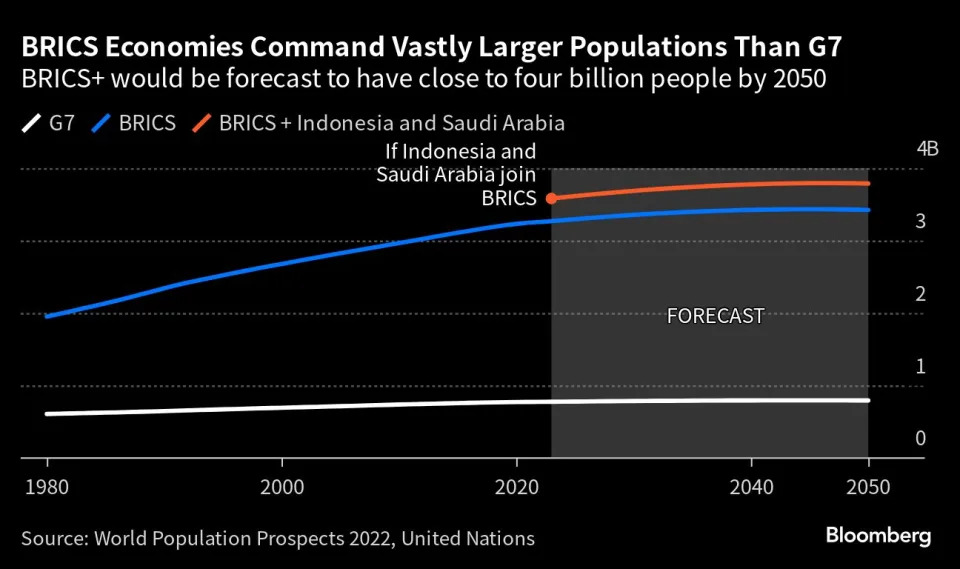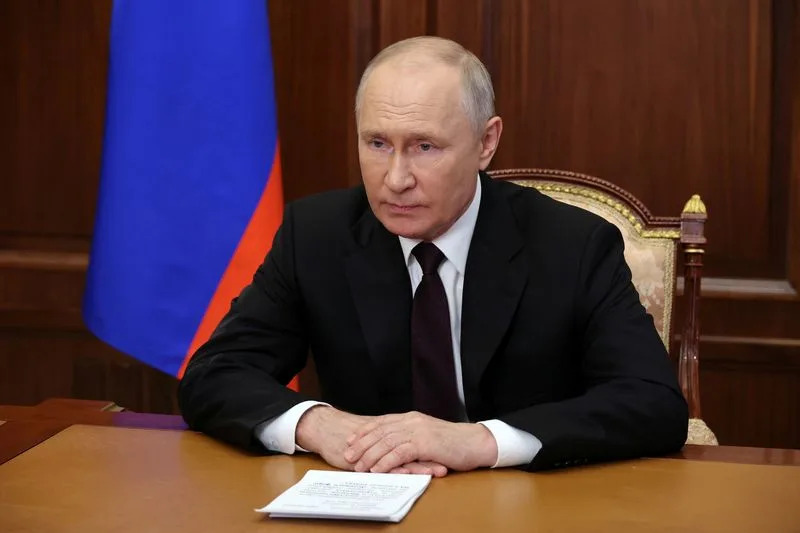Huileng Tan
Updated Mon, August 21, 2023

South Africa is hosting the BRICS summit this week.
Over 40 countries are interested in joining Brazil, Russia, India, China, and South Africa in the BRICS bloc, Reuters reported.
The bloc is seen as an alternative to Western-led blocs dominating the world order.
However, the BRICS bloc faces challenges from rivalry between China and India, and Russia's war in Ukraine.
The BRICS international summit in South Africa this week is drawing interest from countries that are sick and tired of the Western-led blocs.
More than 40 countries have expressed interest in joining Brazil, Russia, India, China, and South Africa in the BRICS bloc as an alternative to Western-led international groupings, Reuters reported on Tuesday, citing South African officials.
South Africa is hosting the 15th summit of the BRICS bloc in Johannesburg from Tuesday to Thursday. The group is considering adding members to its alliance at the meeting.
Of those who have expressed interest, nearly two dozen have formally asked to join the group that represents a quarter of the world's GDP, per Reuters.
South Africa hasn't published a list of new candidates to the bloc, but some of the interested countries include heavily sanctioned Iran and Venezuela, Southeast Asia's largest economy of Indonesia, Saudi Arabia, and the United Arab Emirates.
"The objective necessity for a grouping like BRICS has never been larger," Rob Davies, South Africa's former trade minister, told Reuters. "The multilateral bodies are not places where we can go and have an equitable, inclusive outcome."
It's not just about diversity and creating a more multipolar world.
"Authoritarian countries such as Saudi Arabia and Venezuela are particularly drawn to BRICS as cooperation does not require caveats of protecting human rights and civil liberties," wrote Evan Freidin, an international relations analyst, on the Australian Institute of International Affairs think tank website last Tuesday.
Still, the BRICS group does face challenges, including the long-standing rivalry between China and India, China's economic slowdown, and Russia's war in Ukraine.
As it is, Russian President Vladimir Putin is not attending the BRICS summit in person because South Africa — a member of the International Criminal Court that has a warrant out for Putin — would be compelled to arrest him if he shows up.
The BRICs bloc also doesn't have a de facto leader so far, which makes it less cohesive than Western-led blocs like the G7, Freidin added.
Former Goldman Sachs economist Jim O'Neill coined the term BRIC in 2001. The bloc was formed in 2009 with its first summit, and South Africa joined in 2011, making the grouping BRICS. The group founded the Shanghai-headquartered New Development Bank in 2015. It has approved $32.8 billion worth of financing for 96 development projects in member countries so far, according to the bank's website.
Other than an expansion of the group, the topic of de-dollarization will also be on the summit agenda as the countries discuss ramping up local currency trade.
South Africa's department of international relations and cooperation did not immediately respond to a request for comment from Insider sent outside regular business hours.
Putin, Xi and BRICS Allies See Chance to Shake Up World Order
Simone Preissler Iglesias, S'thembile Cele and Sudhi Ranjan Sen
Sun, August 20, 2023



(Bloomberg) -- The world’s leading emerging market powers have complained for years about being sidelined by wealthy nations. Now they are mounting their most ambitious challenge yet to the status quo.
The BRICS bloc — Brazil, Russia, India, China and South Africa — will use an annual leaders’ summit in Johannesburg this week to begin the process of enlisting more members to bolster its global heft, a push driven mainly by Chinese President Xi Jinping but also backed by Russia and South Africa. There will also be talks on how to accelerate a shift away from the dollar, in part by increasing the use of local currencies in trade between members, which is surging, according to a draft agenda seen by Bloomberg.
The bloc has failed to convert its growing economic might into significant political clout since it began holding summits 15 years ago. But the current splintering of the world order amid rising US-China frictions and the splits over Russia’s invasion of Ukraine provides a fresh opening for it to become a louder voice of the Global South and potentially to challenge the US and its allies.
“We want to make the BRICS very strong politically, very strong financially,” said Brazilian President Luiz Inacio Lula da Silva.
The summit could see the bloc’s first expansion since South Africa was added in 2010. High on the list of potential candidates are Indonesia and Saudi Arabia, as well as the United Arab Emirates, Algeria and Egypt. But India wants the process to be gradual.
An expanded group would represent about half of global output by 2040, Bloomberg Economics estimates show, double the share of the Group of Seven, a reversal from the turn of this century. A bigger BRICS would account for almost half of the global population, up from 42% currently, according to Anil Sooklal, South Africa’s ambassador to the bloc.
“These countries have risen economically, they have voiced their concerns, they’re now capable of offering alternatives if their voices are not heard,” said Karin Vazquez, a Shanghai-based associate professor of diplomatic practice at India’s O.P. Jindal Global University.
To date, deep divisions among members have limited the consensus-driven bloc’s ability to increase its sway at institutions such as the International Monetary Fund, the World Bank or the United Nations Security Council. A BRICS development bank has lent only $32.8 billion in eight years in operation, a tiny fraction of the amount the IMF and World Bank have disbursed over the period. Suggestions that the bloc introduce a common currency haven’t gone anywhere.
The economies of Brazil, South Africa and Russia have all underperformed and China’s is slowing down.
A market capitalization-weighted measure of the five BRICS nations’ stocks has risen 81% since 2009, compared with a 379% rally in the S&P 500 Index. Factor in the weakness of their currencies during this time and their dollar returns look much worse.
Russian President Vladimir Putin is staying away from this year’s summit because he faces a war-crimes arrest warrant from the International Criminal Court, of which host South Africa is a member. He will participate remotely.
The gathering will give him another opportunity to present his narrative of the Ukraine invasion directly to leaders from the Global South, many of whom have been sympathetic to his accounts in the past. Brazil, Russia, India, China and South Africa have been cautious about openly taking Russia’s side in the war, but have also been unwilling to ally with the West in opposing it.
While the European Union sees the BRICS as primarily a talk shop – which could be weakened rather than strengthened by expansion – Putin’s ability to use the group as an international platform is a worry, said an EU official who spoke on condition of anonymity because he isn’t authorized to comment publicly.
The bloc has been a “big disappointment,” said Jim O’Neill, the former Goldman Sachs Group Inc. chief economist who coined the acronym BRIC in 2001 to highlight their rising global heft. “China and India rarely agree on anything, which is a fundamental problem.’’
The world’s two most-populous nations have been locked in a border dispute for years. Their army commanders last week agreed to work swiftly toward easing their differences, opening the door for progress in negotiations between Xi and Indian Prime Minister Narendra Modi.
India is wary that expanding BRICS will transform the group into a mouthpiece for China, while Brazil is also worried about alienating the West, according to officials familiar with the bloc’s internal negotiations. But they are resigned to admitting new members, even as they push for an agreement on the rules and criteria.
“Since BRICS was founded, China's become not only more aggressive regionally, or even along the border with India, but also it, too, wants to be the standard bearer for the Global South,” said Katherine Hadda, a former senior US diplomat who now heads US-India policy studies at the Center for Strategic and International Studies in Washington. “India doesn't want that."
This week’s meeting hosted by South African President Cyril Ramaphosa will be the first in-person BRICS summit since the global pandemic, and Lula, Xi and Modi have confirmed their attendance. Heads of state from more than 30 African counties, along with others from the Global South, will sit in as observers and more than 20 nations have formally expressed interest in becoming members. The bloc’s five leaders will decide who can join and when, with consensus largely reached on an admission policy, according to Sooklal.
“The appeal of BRICS is that it is led by states of the South and is thus seen as a symbolic way of rejecting Western leadership,” said Robert Schrire, a politics professor at the University of Cape Town. “It is this symbolism, rather than any expectation of economic gains, that drives the desire of those who wish to join the bloc.”
--With assistance from Colum Murphy, Anup Roy, Gina Turner, Benjamin Harvey, Eugene Reznik, Iain Marlow, Srinivasan Sivabalan and Scott Johnson.
Reuters
Tue, 22 August 2023

Russian President Putin addresses BRICS summit via video link from Moscow
(Reuters) -Russian President Vladimir Putin said the BRICS grouping of countries was on course to meet the aspirations of most of the world's population, according to recorded remarks at a summit of the BRICS countries in South Africa on Tuesday.
"We cooperate on the principles of equality, partnership support, respect for each other’s interests, and this is the essence of the future-oriented strategic course of our association, a course that meets the aspirations of the main part of the world community, the so-called global majority," Putin said.
The BRICS members - Brazil, Russia, India, China and South Africa - represent more than 40% of the world's population and the summit is expected to discuss adding new members, but he did not address that question in his remarks.
Putin was unable to attend the summit in person because of an arrest warrant issued for him in March by the International Criminal Court (ICC), accusing him of war crimes in Ukraine.
Russia rejected the accusation as outrageous and said the move had no legal meaning because it is not a member of the ICC. South Africa is a member, however, meaning it would have been obliged to arrest him if he had travelled there.
Putin said the summit would discuss in detail the question of switching trade between member countries away from the U.S. dollar and into national currencies, a process in which the BRICS' New Development Bank would play a big role.
"The objective, irreversible process of de-dollarization of our economic ties is gaining momentum," he said.
TRADE ROUTES
BRICS is an increasingly important forum for Russia at a time when its economy is grappling with Western sanctions over the war in Ukraine and it is looking to build new diplomatic and trade relations with Asia, Africa and Latin America.
Putin said Russia was looking to develop two flagship projects in particular - a northern sea route with new ports, fuel terminals and an expanded icebreaker fleet, and a north-south corridor connecting Russian ports with sea terminals in the Gulf and in the Indian Ocean.
He said Russia would remain a reliable food supplier to Africa and was finalising talks on providing free grain to a group of African countries, as he promised at a summit in St Petersburg last month.
The promise came after Russia pulled out of a deal that had enabled Ukraine to export grain from its Black Sea ports, and after it repeatedly bombed Ukrainian ports and grain stores, leading Kyiv and the West to accuse it of using food as a weapon of war.
(Reporting by Reuters, writing by Mark Trevelyan; Editing by Bernadette Baum)
No comments:
Post a Comment